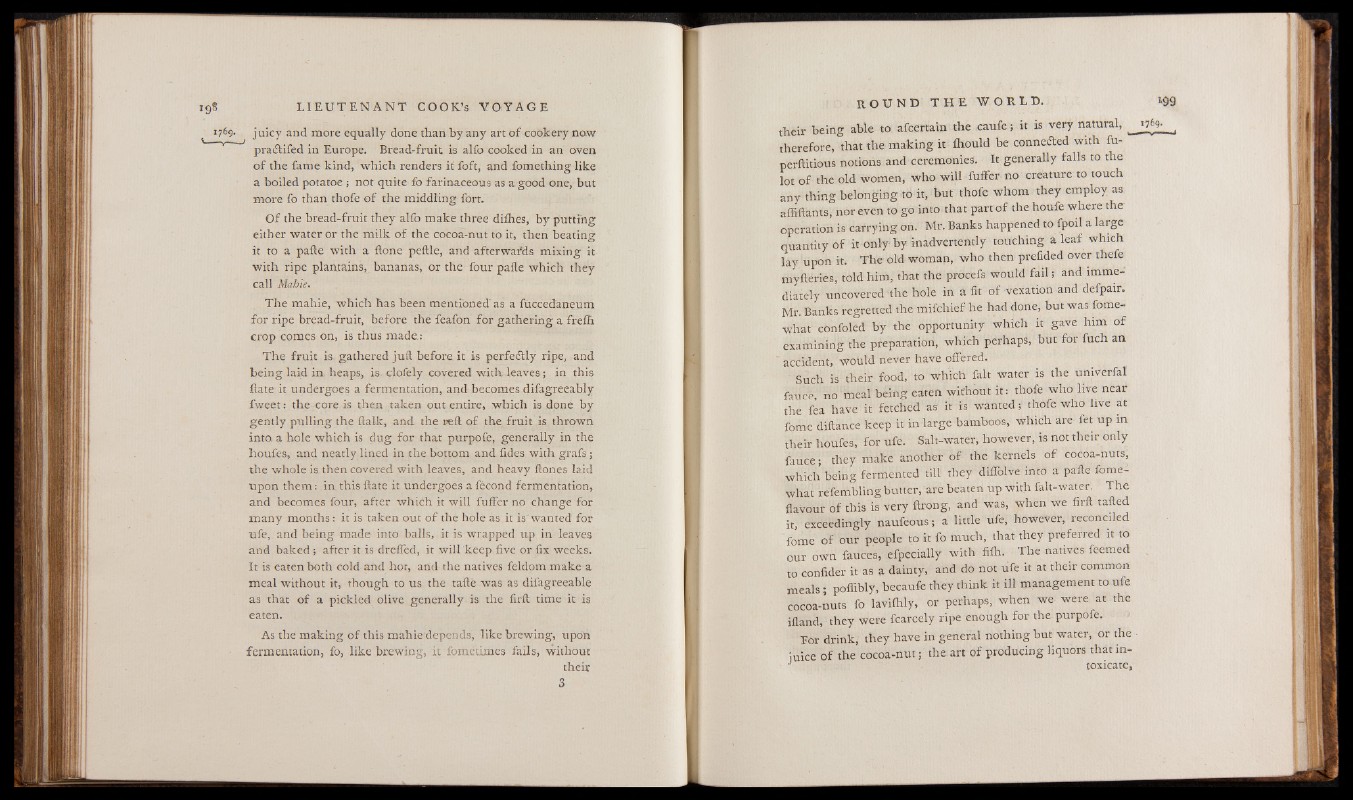
198
1769* juicy and more equally done than by any art o f cookery now
practifed in Europe. Bread-fruit is alfo cooked in an oven
of the fame kind, which renders it foft, and fomething like
a boiled potatoe ; not quite fo farinaceous as a good one, but
more fo than thofe of the middling fort.
Of the bread-fruit they alfo make three difhes, by putting
either water or the milk of the cocoa-nut to it, then beating
it to a pafte with a Hone peftle, and afterwards mixing it
with ripe plantains, bananas, or the four pafte which they
call Mahie.
The mahie, which has been mentioned" as a fùccedàneum
for ripe bread-fruit, before the feafon for gathering a frelh
crop comes on, is thus made.:
The fruit is. gathered juft before it is perfedtly ripe, and
being laid in heaps, is. clofely covered with leaves ; in this
ftate it undergoes a fermentation, and becomes difagreeably
fweet: the core is then taken out entire, which is done by
gently pulling the ftalk, and the reft of the fruit is thrown
into a hole which is dug for that purpofe, generally in the
houfes, and neatly lined in the bottom and fides with grafs ;
the whole is then covered with leaves, and heavy ftones laid
upon them : in this ftate it undergoes a fécond fermentation,
and becomes four, after which it will fufier no change for
many months: it is taken out of the hole as it is;wanted for
ufe, and being made into balls, it is wrapped up in leaves
and baked ; after it is drefied, it will keep five or fix weeks.
It is eaten both cold and hot, and the natives feldom make a
meal without it, though to us the taftë was as difagreeable
as that of a pickled olive generally is the firft time it is
eaten.
As the making of this mahie depends, like brewing, upon
fermentation, fo, like brewing, it fometimes fails, without
their
3
their being able to afcertain the caufe; it is very natural, »769- .
therefore, that the making it fhould be connected with fu-
perftitious notions and ceremonies. It generally falls to the
lot of the old women, who will fuffer no creature to touch
any thing belonging to it, but thofe whom they employ as
affiftants, nor even to go into that part of the houfe where the
operation is carrying on. Mr. Banks happened to fpoil a large
quantity of it o n l y by inadvertently touching a leaf which
lay upon it. The old woman, who then prefided over thefe
myfteries, told him, that the procefs would fa il; and immediately
uncovered the hole in a fit of vexation and defpair.
Mr. Banks regretted the mifchief he had done, but was fome-
what confoled by the opportunity which it gave him of
examining the preparation, which perhaps, but for fuch an
accident, would never have offered.
Such is their food, to which fait water is the univerfal
fauce, no meal being eaten without it: thofe who live near
the fea have it fetched as it is wanted; thofe who live at
fome diftance keep it in large bamboos, which are fet up in
their houfes, for ufe. Salt-water, however, is not their only
fauce; they make another of the kernels of cocoa-nuts,
which being fermented till they diflolve into a pafte lome-
what refembling butter, are beaten up with falt-water. The
flavour of this is very ftrong, and was, when we firft tailed
it, exceedingly naufeous; a little ufe, however, reconciled
fome of our people to it fo much, that they preferred it to
our own fauces, efpecially with filh. The natives feemed
to confider it as a dainty, and do not ufe it at their common
meals ; poflibly, becaufe they think it ill management to ufe
cocoa-nuts fo lavilhly, or perhaps, when we were at the
ifland, they were fcarcely ripe enough for the purpofe.
For drink, they have in general nothing but water, or the
juice of the cocoa-nut; the art of producing liquors thatm-
■ toxicate,